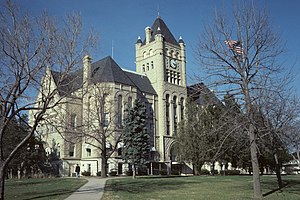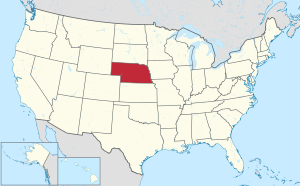|
Gage County, Nebraska
Gage County is a county in the U.S. state of Nebraska. As of the 2020 United States Census, the population was 21,704.[1] Its county seat is Beatrice.[2] The county was created in 1855 and organized in 1857.[3][4][5] It was formed from land taken from the Otoe in an 1854 treaty. The county was named for William D. Gage, a Methodist minister who served as the first chaplain of the Nebraska Territorial Legislature.[6][7] Gage County comprises the Beatrice, NE Micropolitan Statistical Area, which is also in the Lincoln-Beatrice, NE Combined Statistical Area. In the Nebraska license plate system, Gage County is represented by the prefix 3 (it was the county with the third-largest number of vehicles registered in the state when the license plate system was established in 1922). GeographyGage County lies on the southern border of Nebraska, with its southern boundary line abutting the northern border of the state of Kansas. The Big Blue River runs south-southeast through the central part of the county. According to the US Census Bureau, the county has a total area of 860 square miles (2,200 km2), of which 851 square miles (2,200 km2) is land and 8.5 square miles (22 km2) (1.0%) is water.[8] Major highwaysAdjacent counties
Protected areas
Demographics
As of the 2000 United States Census,[15] there were 22,993 people, 9,316 households, and 6,204 families in the county. The population density was 27 people per square mile (10 people/km2). There were 10,030 housing units at an average density of 12 units per square mile (4.6/km2). The racial makeup of the county was 97.69% White, 0.32% Black or African American, 0.58% Native American, 0.28% Asian, 0.03% Pacific Islander, 0.26% from other races, and 0.84% from two or more races. 0.85% of the population were Hispanic or Latino of any race. 56.6% were of German, 6.9% Irish, 6.3% English and 6.3% American ancestry. There were 9,316 households, out of which 30.30% had children under the age of 18 living with them, 56.70% were married couples living together, 7.10% had a female householder with no husband present, and 33.40% were non-families. 29.20% of all households were made up of individuals, and 15.00% had someone living alone who was 65 years of age or older. The average household size was 2.36 and the average family size was 2.91. The county population contained 24.00% under the age of 18, 7.70% from 18 to 24, 26.30% from 25 to 44, 22.80% from 45 to 64, and 19.20% who were 65 years of age or older. The median age was 40 years. For every 100 females there were 94.10 males. For every 100 females age 18 and over, there were 91.40 males. The median income for a household in the county was $34,908, and the median income for a family was $43,072. Males had a median income of $29,680 versus $21,305 for females. The per capita income for the county was $17,190. About 6.60% of families and 8.70% of the population were below the poverty line, including 9.70% of those under age 18 and 8.00% of those age 65 or over. CommunitiesCities
VillagesCensus-designated placeUnincorporated communitiesTownshipsPoliticsPrior to 1940, Gage County was a swing county, backing the national winner in every presidential election from 1900 to 1936. Since then, it has become a Republican stronghold, aside from the 1964 election in which Democrat Lyndon B. Johnson won the county in the midst of his national landslide victory.
See alsoReferences
External linksWikimedia Commons has media related to Gage County, Nebraska. |
|||||||||||||||||||||||||||||||||||||||||||||||||||||||||||||||||||||||||||||||||||||||||||||||||||||||||||||||||||||||||||||||||||||||||||||||||||||||||||||||||||||||||||||||||||||||||||||||||||||||||||||||||||||||||||||||||||||||||||||||||||||||||||||||||||||||||||||||||||||||||||||||||||||||||||||||||||||||||||||||||||||||||||||||||||||||||||||||||||||||||



